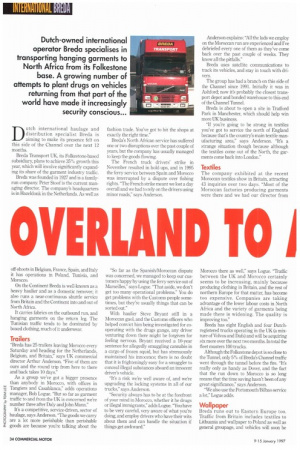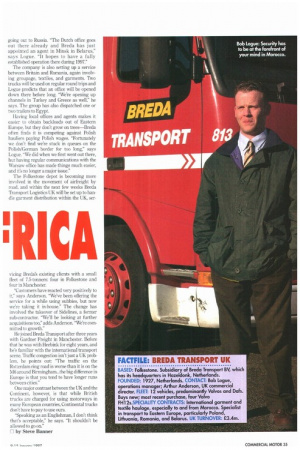011 111.1111D TO A
Page 36

Page 37

If you've noticed an error in this article please click here to report it so we can fix it.
CA
Dutch-owned international operator Breda specialises in transporting hanging garments to North Africa from its Folkestone base. A growing number of attempts to plant drugs on vehicles returning from that part of the world have made it increasingly security conscious...
Dutch international haulage and distribution specialist Breda is aiming to make its presence felt on this side of the Channel over the next 12 months.
Breda Transport UK, its Folkestone-based subsidiary, plans to achieve 35% growth this year, which will involve significantly expanding its share of the garment industry traffic.
Breda was founded in 1927 and is a familyrun company. Peter Stoof is the current managing director. The company's headquarters is in Hazeldonk in the Netherlands. As well as off-shoots in Belgium, France, Spain, and Italy it has operations in Poland, Tunisia, and Morocco.
On the Continent Breda is well-known as a heavy haulier and as a domestic remover; it also runs a near-continuous shuttle service from Britain and the Continent into and out of North Africa.
It carries fabrics on the outbound run, and hanging garments on the return leg. The Tunisian traffic tends to be dominated by boxed clothing, much of it underwear.
Trailers
"Breda has 25 trailers leaving Morocco every Saturday and heading for the Netherlands, Belgium, and Britain," says UK commercial director Arthur Anderson. "Five of them are ours and the round trip from here to there and back takes 10 days"
As a group we've got a bigger presence than anybody in Morocco, with offices in Tangiers and Casablanca," adds operations manager, Bob Logue. "But so far as garment traffic to and from the UK is concerned we're number three after Daly and John Mann."
It's a competitive, service-driven, sector of haulage, says Anderson. "The goods we carry are a lot more perishable than perishable goods are because you're talking about the fashion trade. You've got to hit the shops at exactly the right time."
Breda's North African service has suffered one or two disruptions over the past couple of years, but the company has usually managed to keep the goods flowing.
The French truck drivers' strike in November resulted in hold-ups, and in 1995 the ferry service between Spain and Morocco was interrupted by a dispute over fishing rights. "The French strike meant we lost a day overall and we had to rely on the drivers using minor roads," says Anderson.
"So far as the Spanish/Moroccan dispute was concerned, we managed to keep our customers happy by using the ferry service out of Marseilles," says Logue. "That aside, we don't get too many operational problems." You do get problems with the Customs people sometimes, but they're usually things that can be sorted out."
With haulier Steve Bryant still in a Moroccan gaol, and the Customs officers who helped convict him being investigated for cooperating with the drugs gangs, any driver venturing down there might be forgiven for feeling nervous. Bryant received a 10-year sentence for allegedly smuggling cannabis in a cargo of frozen squid, but has strenuously maintained his innocence; there is no doubt that it is frighteningly easy for a smuggler to conceal illegal substances aboard an innocent driver's vehicle.
"It's a risk we're well aware of, and we're upgrading the locking systems in all of our trucks," says Anderson.
"Security always has to be at the forefront of your mind in Morocco, whether it be drugs or illegal immigrants," adds Logue. "You have to be very careful, very aware of what you're doing, and employ drivers who have their wits about them and can handle the situation if things get awkward." Anderson explains: "All the lads we employ on the Moroccan run are experienced and I've debriefed every one of them as they've come back over the past couple of weeks. They know all the pitfalls."
Breda uses satellite communications to track its vehicles, and stay in touch with drivers.
The group has had a branch on this side of the Channel since 1991. Initially it was in Ashford; now it's probably the closest transport depot and bonded warehouse to this end of the Channel Tunnel.
Breda is about to open a site in Trafford Park in Manchester, which should help win more UK business.
"If you're going to be strong in textiles you've got to service the north of England because that's the country's main textile manufacturing area," says Anderson. "It's a strange situation though because although the textiles come out of the North, the garments come back into London."
Textiles
The company exhibited at the recent Moroccan textiles show in Britain, attracting 43 inquiries over two days. "Most of the Moroccan factories producing garments were there and we had our director from
Morocco there as well," says Logue. "Traffic between the UK and Morocco certainly seems to be increasing, mainly because producing clothing in Britain, and the rest of northern Europe for that matter, has become too expensive. Companies are taking advantage of the lower labour costs in North Africa and the variety of garments being made there is widening. The quality is improving too."
Breda has eight English and four Dutchregistered trucks operating in the UK (a mixture of Volvos and Dafs) and will be acquiring six more over the next two months. In total the fleet musters 100 trucks.
Although the Folkestone depot is so close to the Tunnel, only 5% of Breda's Channel traffic went through the tunnel before the fire. "It's really only as handy as Dover, and the fact that the run down to Morocco is so long means that the time saving hasn't been of any great significance," says Anderson.
"We also use the Portsmouth/Bilbao service a lot," Logue adds.
Wallpaper
Breda runs out to Eastern Europe too. Traffic from Britain includes textiles to Lithuania and wallpaper to Poland as well as general groupage, and vehicles will soon be
going out to Russia. "The Dutch office goes out there already and Breda has just appointed an agent in Minsk in Belarus," says Logue. "It hopes to have a fully established operation there during 1997."
The company is also setting up a service between Britain and Romania, again involving groupage, textiles, and garments. Two trucks will be used on regular round trips and Logue predicts that an office will be opened down there before long. "We're opening up channels in Turkey and Greece as well," he says. The group has also dispatched one or two trailers to Egypt.
!laving local offices and agents makes it easier to obtain backloads out of Eastern Europe. but they don't grow on trees—Breda often finds it is competing against Polish hauliers paying Polish wages. "Fortunately we don't find we're stuck in queues on the Polish/German border for too long," says Logue. "We did when we first went out there, but having regular communications with the Warsaw office has made things much easier, and it's no longer a major issue."
The Folkestone depot is becoming more involved in the movement of airfreight by road, and within the next few weeks Breda Transport Logistics UK will be set up to handle garment distribution within the UK, ser vicing Breda's existing clients with a small fleet of 7.5-tonners: four in Folkestone and four in Manchester.
"Customers have reacted very positively to it," says Anderson. "We've been offering the service for a while using subbies, but now we're taking it in-house." The change has involved the takeover of Sidelines, a former sub-contractor. "We'll be looking at further acquisitions too," adds Anderson. "We're committed to growth."
He joined Breda Transport after three years with Gardner Freight in Manchester. Before that he was with neebink for eight years, and he's familiar with the international transport scene. Traffic congestion isn't just a UK problem, he points out: "The traffic on the Rotterdam ring road is worse than it is on the M6 around Birmingham...the big difference in Europe is that you tend to have longer runs between cities."
One major contrast between the UK and the Continent, however, is that while British trucks are charged for using motorways in many European countries, Continental trucks don't have to pay to use ours.
"Speaking as an Englishman, I don't think that's acceptable," he says. "It shouldn't be allowed to go on."
7 by Steve Banner
































































































